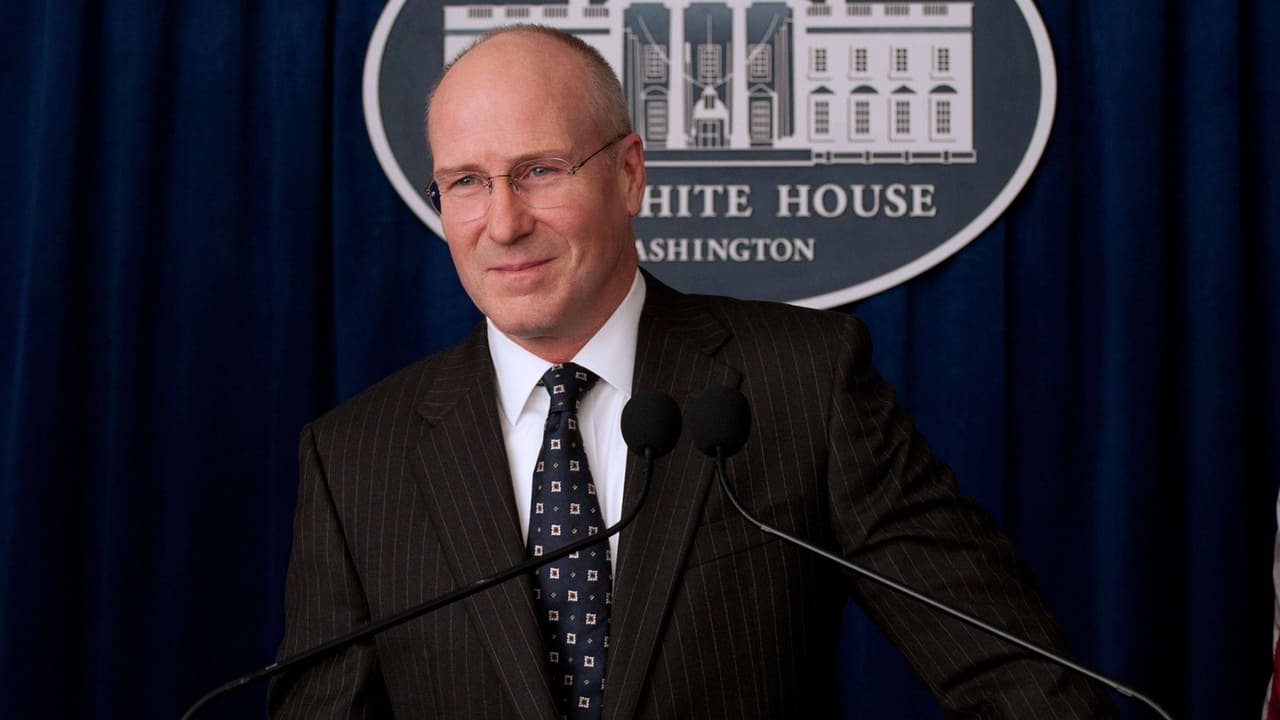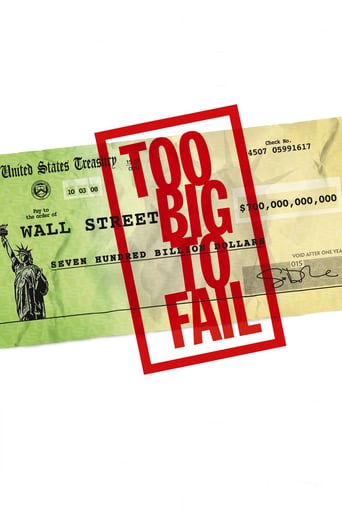Solemplex
To me, this movie is perfection.
FeistyUpper
If you don't like this, we can't be friends.
Grimossfer
Clever and entertaining enough to recommend even to members of the 1%
Mathster
The movie runs out of plot and jokes well before the end of a two-hour running time, long for a light comedy.
mike3386
The kind of movie I want to like, but the facts kept getting in the way.So, it's fiction? No, not really, every real person is precisely identified, right down to using actual names and screen labels. So, it's a docudrama? No, not really, otherwise Hank Paulson would not have been the central character, played by the fine actor William Hurt, nor cast in any role even faintly resembling the financial savior of our Country. Don't believe me? Then watch the real Senate hearings with the real Paulson, and his constantly changing ready-fire-aim approach while still posturing for Wall Street after arriving late for his sworn job of bank regulator. If the real facts interest you, watch "Inside Job", which tries to shine some light on this massive corruption at the highest levels and the looting of the American Treasury.But if you want to see good actors re-enact just how close we came to rending forever the financial fabric of this Country, while playing high stakes "Let's Make a Deal", this movie will git er done. Matter of fact, with real, official Washington openly throwing around terms at the time like "financial meltdown", one can only wonder what kept it from happening. Wait! I know! John Q. Taxpayer stepped up with $700 billion, later reduced to $475 billion, so that the Wall Street Wizards could continue funding golden parachutes and outrageous salaries. -------------------------------------------------------------------- From the movie, and in reality very close to what happened: "Michele Davis: They almost bring down the US economy as we know it but we can't put restrictions on how they spend the $125 billion we're giving them because... they might not take it!"The Assistant Secretary of the Treasury for Public Affairs upon hearing that the nine bank CEOs may refuse to take free money from the federal government if they had to be held accountable for how they spent it". ------------------------------------------------------------------ BTW, the real Ms. Davis is now Global Head of Corporate Affairs for Morgan Stanley . . . you really can't make up stuff like this.
xyzthedude
Movie is not very revealing. Nothing about what went wrong in the financial crisis is delved into in this movie. Most of the movie re-enacts what the major guys were trying to do while the crisis was unfolding, albeit playing to typical stereotypes- The cool guy who runs JP Morgan chase vs the confused Indian guy who runs an even bigger Citigroup? I also believe some of the worst offenders of this crisis were dealt sympathetically in a way that is unfair to their role in causing the crisis. Also has subtle racism (against say Vikram Pandit), clichés and panders to the viewers. You can skip this movie and see some other ones on financial crisis.
kelly-ann-mchale
Unfortunately the filmmakers felt the need to create a "hero" of the piece -- unlike the source book, which simply tells what happened. They chose Henry Paulson (William Hurt), ex-Goldman Sachs CEO turned Treasury Secretary. But the real-life Paulson is no hero.The film makes a point that Paulson sold all his Goldman stock before becoming Treasury Sec, but fails to point out that he was excused from all taxes on the sale, which saved him upwards of $50 million.The film also whitewashes Paulson's $150 billion AIG bailout, claiming that AIG owed money to almost everybody in the world. In fact, AIG's largest creditor was, that's right, Goldman Sachs. Paulson failed to negotiate a hard-nosed payout of AIG's obligations, such as offering creditors 50c on the dollar, which the creditors would have had no choice but to accept. This would have saved US taxpayers a cool $75 billion. But it would have hurt Paulson's pals at Goldman.My point being, Paulson was thoroughly compromised, and managed to feather his own nest and that of his old pals. What next? A stirring depiction of Dick Cheney's altruistic hiring of Halliburton in Iraq? This shortcoming aside, the film clips along nicely, and it's fun to see so many name actors portraying the Wall Street titans. James Woods is a perfect Dick Fuld.
Mac1958
As a financial adviser, I have two very different thoughts on "Too Big to Fail".First, I was fascinated by the human element - the relationships between decision-makers, the communication, the uncertainty, the failings and doubts we all possess. We all read the headlines, but rarely are we given even the slightest insight about the decision-making processes that affect us all.Second, and unfortunately, the story is told with such obvious omissions and distortions that it is clear writer Andrew Ross Sorkin not only carries a partisan grudge, but made little attempt to hide that grudge in the script. Just a few examples of many: 1. One clear "villain" of the meltdown was the American consumer - those who willingly purchased homes they quite well knew they couldn't afford, took advantage of 125% refi's to pay off credit cards so that they could run them up again, tapped into their equity for trips, cars, boats and other goodies, etc. Instead, they were clearly portrayed as victims, and the only time a reference is made to them is when the biggest villain in the film, Dick Fuld, is scoffing at them.2. Legislators Barney Frank and Chris Dodd, who are documented to have made errors in judgment leading up to the crisis, are portrayed as having absolutely nothing to do with it, completely stunned that this was happening - worse, they come off as passionate defenders of the people. Only someone who knows absolutely nothing of this crisis would fall for this. Come on, Mr. Sorkin.3. Then-SEC Chairman Christopher Cox, the highest-profile Republican in the story, is portrayed as a bumbling, indecisive, oafish fool. If the rest of the film were not so left-leaning, this portrayal may not have been so obvious. Instead, it falls right in line with the rest of the partisan approach.4. When assistant Michele Davis asks why regulators failed to notice and act upon the blatant problems in the mortgage industry, Hank Paulson sheepishly responds, "because we were making too much money." What?! The federal government failed to do its job because some people were making a lot of money? Wouldn't an indictment of such magnitude warrant a much larger inspection during this movie? Instead, it's just passed off as "greed". Astonishing.5. Blame for the entire economic meltdown is placed in one place, and one place only: Those Evil Banks. Not one ounce of blame (outside of the ridiculous statement in #4, above) is placed on the massive failure of regulators to do their job; on the consumers who willingly signed on the dotted line, on the bureaucrats from both parties who pushed Fannie Mae and Freddie Mac to make bad loans in the interest of "fairness." I could go on. In short, partisan politics (from BOTH sides) have so polluted our everyday culture that it's now impossible to believe anything you hear, read or see. "Too Big To Fail" is a vivid example.Here's the problem: This film had a chance to teach us critical lessons about the financial meltdown. An accurate approach could have served as a road map for the future, a warning siren to everyone from politicians to Wall Streeters to regular citizens on the dangers of personal greed, of poor political leadership and of the need for more effective regulation of financial markets.Instead, it's just another political statement disguised as "fact". What a shame..

